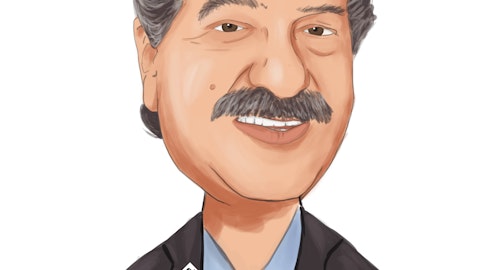But under normal circumstances, that’s a little bit how we approach the planning and you lay that out to what the right timelines are, where in the network, it fits in, and should we expand capacity? Do we work with a partner? Et cetera. Depending on what kind of product and the strategic importance and fit of it. As you look at the return on it, we look at that primarily really from a cash flow perspective, right? There is a cash investment upfront. And obviously, we need to recoup that and generate a return and a little bit the size of that there is not a specific number to say. Okay. If it exceeds X then it’s yes. And if it’s below, then it’s no. Depends a little bit on the risk of the investment, how well do we know the technology, how well are we sort of feeling confident in being able to fill the asset, et cetera.
And so there is a risk balance there between what kind of return you expect obviously when making that decision. But in general, the returns are pretty high on the organic investments you do and the capital investments we make. So it’s usually a pretty straightforward decisions.
Ted Harris: I think certainly, Bob, over time and this is maybe the no-brainer comment of the day. But over time we certainly find that the lowest risk, highest return investments that we made typically are in our own asset expansion because we are in the market, we have good line of sight into the growth. Our margins are healthy. And so we really like to be able to invest in the existing products and infrastructure and go after the growth platforms and the market affords us in these products.
Bob Labick: Okay. Great. A lot of helpful color there. Appreciate that. And then just switching over to just HNH in general, a very strong margins in the quarter. I’m wondering if you could talk about Kappa which was, I believe, higher margin business, but then impacted by inventory correction. Has that kind of got back to normalization? Or how is that impacting the margins in HNH? And how is that progressing on terms of which normalization sales cycle?
Ted Harris: Yes. So you’re right. We were really pleased with overall HNH results. Obviously, from an organic growth perspective, it’s not where we would like it to be, given the overall market environment. But margins were very strong. And we really had to do with a favorable mix. The businesses that performed the best tended to be the higher-margin businesses, I think our price discipline was very, very good in the quarter as it normally is. Raw material deflation is benefiting but also spend controls in our manufacturing plants on somewhat lower volume. So it’s multifaceted. And we were very pleased to see the overall profitability margin improvement in the quarter. And yes, the K2 sales from Kappa are accretive. The margin profile of Kappa is higher than our average profile as a company and the average profile of HNH.
So the margin profile of that business is accretive and contributed. And while I wouldn’t say — you used the word has it normalized, I would not say it has normalized, nor would I say that the overall minerals and nutrients business has normalized. We did comment that we’re really pleased to think — to see that it had stabilized over the course of the quarter. And I would say that was true about the K2 and the Kappa business. Q2 of 2023 was the best quarter for Kappa and K2 since the acquisition. Of course, we acquired it just as the market was turning down. And so we’ve seen it stabilize, starts to pick up not quite back to the normalization that we would like to see. But the margins are contributing nicely and the overall Kappa business contributed nicely to the results this quarter as well.
Operator: Our next question comes from the line of Ram Selvaraju with H.C. Wainwright. Please proceed with your question.




